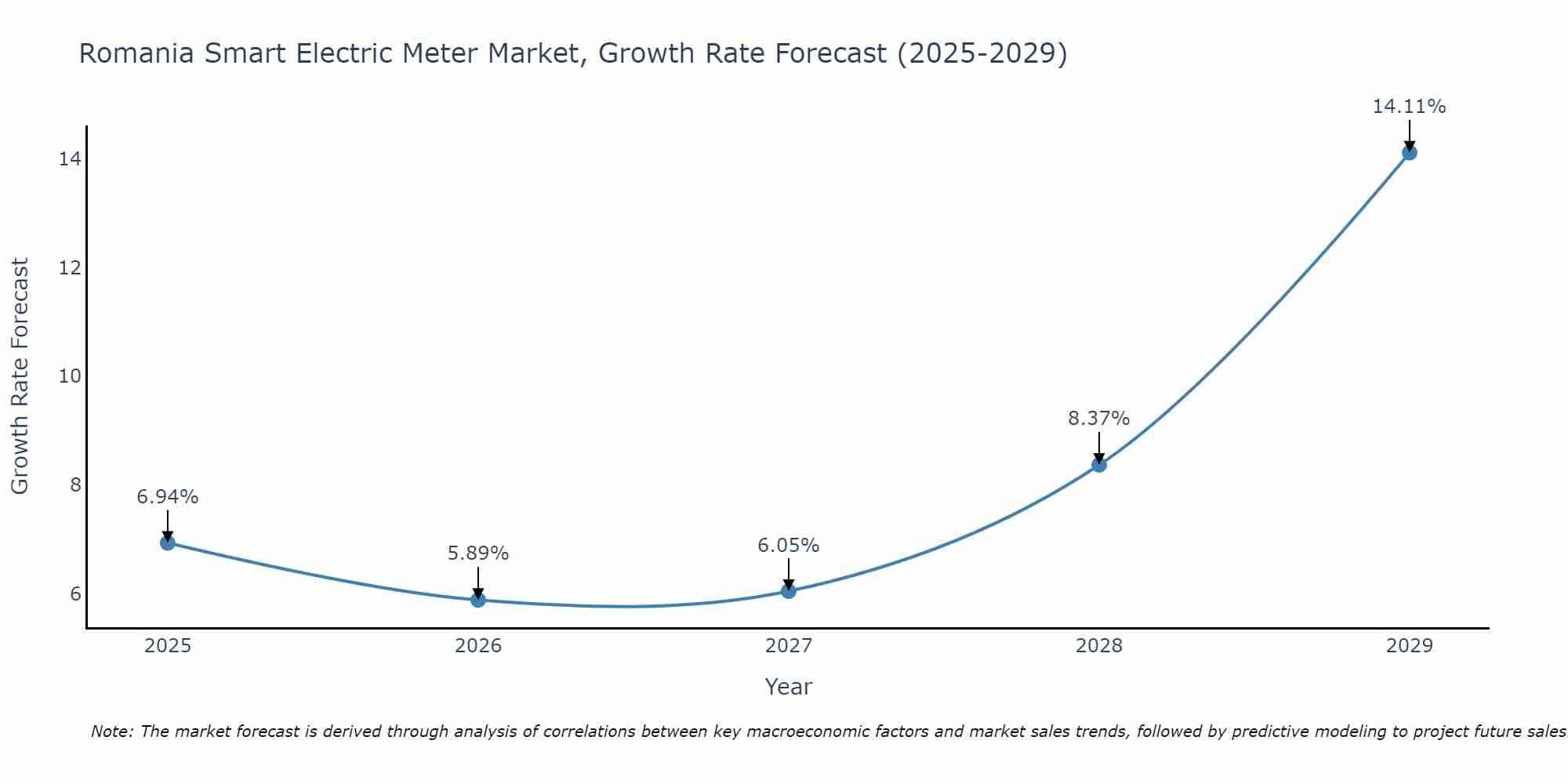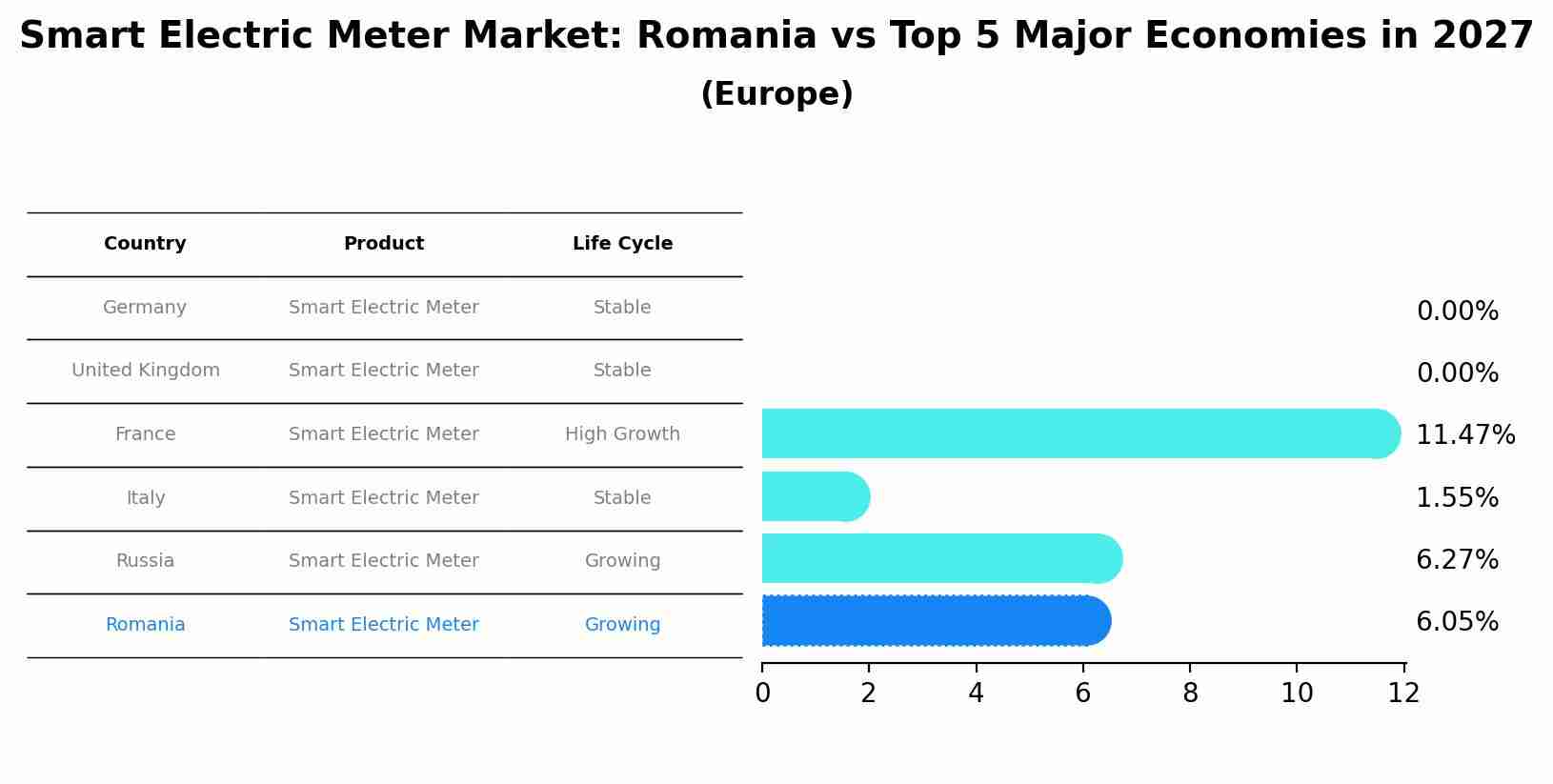Romania Smart Electric Meter Market Outlook | Forecast, Size, Trends, COVID-19 IMPACT, Value, Companies, Revenue, Analysis, Growth, Share & Industry
| Product Code: ETC369318 | Publication Date: Aug 2022 | Updated Date: Jul 2025 | Product Type: Market Research Report | |
| Publisher: 6Wresearch | Author: Summon Dutta | No. of Pages: 75 | No. of Figures: 35 | No. of Tables: 20 |
Romania Smart Electric Meter Market Size Growth Rate
The Romania Smart Electric Meter Market is projected to witness mixed growth rate patterns during 2025 to 2029. Commencing at 6.94% in 2025, growth builds up to 14.11% by 2029.

Smart Electric Meter Market: Romania vs Top 5 Major Economies in 2027 (Europe)
In the Europe region, the Smart Electric Meter market in Romania is projected to expand at a growing growth rate of 6.05% by 2027. The largest economy is Germany, followed by United Kingdom, France, Italy and Russia.

Romania Smart Electric Meter Market Synopsis
The Romania Smart Electric Meter Market is experiencing steady growth driven by government initiatives promoting energy efficiency and increasing focus on renewable energy sources. Smart meters offer consumers real-time data on energy consumption, enabling better management and cost savings. Key players in the market include Landis+Gyr, Itron Inc., and Siemens AG, offering advanced metering infrastructure solutions. The market is characterized by increasing investments in smart grid infrastructure, rising awareness among consumers regarding energy conservation, and regulatory mandates for smart meter installations. However, challenges such as high initial costs and data privacy concerns hinder market growth. Overall, the Romania Smart Electric Meter Market is poised for expansion as the country advances towards a more sustainable and efficient energy infrastructure.
Romania Smart Electric Meter Market Trends
The Smart Electric Meter Market in Romania is experiencing significant growth driven by various trends. One key trend is the increasing adoption of smart grid technology to improve energy efficiency and optimize energy consumption. This is leading to a rising demand for smart electric meters that can provide real-time data on energy usage and enable better monitoring and control of electricity consumption. Another trend is the government`s efforts to modernize the country`s energy infrastructure, including the deployment of smart meters to meet energy efficiency targets and reduce carbon emissions. Furthermore, the growing awareness among consumers about the benefits of smart meters in managing electricity costs and promoting sustainability is fueling the market growth. Overall, these trends are shaping the Romania Smart Electric Meter Market towards a more efficient and sustainable energy ecosystem.
Romania Smart Electric Meter Market Challenges
In the Romania Smart Electric Meter Market, one of the key challenges is the high initial investment required for the deployment of smart metering infrastructure. This includes the cost of purchasing and installing smart meters, as well as integrating them with existing systems. Additionally, there may be resistance from consumers who are concerned about privacy issues related to the collection of their energy usage data. Furthermore, regulatory and policy uncertainties can also hinder the widespread adoption of smart meters in Romania. Addressing these challenges will require collaboration between utilities, government entities, and technology providers to develop cost-effective solutions, ensure data security and privacy, and establish clear regulatory frameworks to promote the deployment of smart electric meters across the country.
Romania Smart Electric Meter Market Investment Opportunities
The Romania Smart Electric Meter Market presents promising investment opportunities due to the country`s increasing focus on energy efficiency and sustainability. With the government mandating the deployment of smart meters to improve energy management and reduce losses, there is a growing demand for advanced metering solutions. Investors can capitalize on this trend by investing in smart meter technology providers, data analytics companies, and energy management system developers operating in Romania. Additionally, opportunities exist in offering innovative solutions such as demand response programs and integrated smart grid solutions. As the market continues to mature and expand, strategic partnerships with utilities and regulatory bodies can further enhance investment prospects in the Romania Smart Electric Meter Market.
Jordan Agar Market Government Policies
In Romania, the government has implemented several policies aimed at promoting the adoption of smart electric meters. One key policy is the National Energy Strategy, which emphasizes the importance of modernizing the energy sector and increasing energy efficiency. The government also introduced a program to install smart meters in households and businesses to enable more accurate and real-time electricity consumption monitoring. Additionally, regulations have been put in place to ensure that electricity suppliers offer smart metering services to customers, thereby encouraging the widespread deployment of smart meters across the country. These policies reflect Romania`s commitment to transitioning towards a more sustainable and efficient energy infrastructure through the use of smart technologies in the electric meter market.
Romania Smart Electric Meter Market Future Outlook
The Romania Smart Electric Meter Market is expected to witness significant growth in the coming years due to increasing government initiatives promoting energy efficiency and the adoption of smart grid technologies. The market is likely to be driven by factors such as the need for accurate billing, improved grid management, and the growing focus on sustainability. Additionally, the rising demand for digital solutions and the modernization of the electricity infrastructure are expected to fuel the adoption of smart electric meters in Romania. With advancements in technology and the increasing awareness of the benefits of smart meters, the market is projected to expand steadily, offering opportunities for both domestic and international players to invest in this growing sector.
Key Highlights of the Report:
- Romania Smart Electric Meter Market Outlook
- Market Size of Romania Smart Electric Meter Market, 2021
- Forecast of Romania Smart Electric Meter Market, 2031
- Historical Data and Forecast of Romania Smart Electric Meter Revenues & Volume for the Period 2018 - 2031
- Romania Smart Electric Meter Market Trend Evolution
- Romania Smart Electric Meter Market Drivers and Challenges
- Romania Smart Electric Meter Price Trends
- Romania Smart Electric Meter Porter's Five Forces
- Romania Smart Electric Meter Industry Life Cycle
- Historical Data and Forecast of Romania Smart Electric Meter Market Revenues & Volume By Phase for the Period 2018 - 2031
- Historical Data and Forecast of Romania Smart Electric Meter Market Revenues & Volume By Single for the Period 2018 - 2031
- Historical Data and Forecast of Romania Smart Electric Meter Market Revenues & Volume By Three for the Period 2018 - 2031
- Historical Data and Forecast of Romania Smart Electric Meter Market Revenues & Volume By Communication Technology Type for the Period 2018 - 2031
- Historical Data and Forecast of Romania Smart Electric Meter Market Revenues & Volume By Power Line Communication (PLC) for the Period 2018 - 2031
- Historical Data and Forecast of Romania Smart Electric Meter Market Revenues & Volume By Radio Frequency (RF) for the Period 2018 - 2031
- Historical Data and Forecast of Romania Smart Electric Meter Market Revenues & Volume By Cellular for the Period 2018 - 2031
- Historical Data and Forecast of Romania Smart Electric Meter Market Revenues & Volume By End-Users for the Period 2018 - 2031
- Historical Data and Forecast of Romania Smart Electric Meter Market Revenues & Volume By Industrial for the Period 2018 - 2031
- Historical Data and Forecast of Romania Smart Electric Meter Market Revenues & Volume By Commercial for the Period 2018 - 2031
- Historical Data and Forecast of Romania Smart Electric Meter Market Revenues & Volume By Residential for the Period 2018 - 2031
- Romania Smart Electric Meter Import Export Trade Statistics
- Market Opportunity Assessment By Phase
- Market Opportunity Assessment By Communication Technology Type
- Market Opportunity Assessment By End-Users
- Romania Smart Electric Meter Top Companies Market Share
- Romania Smart Electric Meter Competitive Benchmarking By Technical and Operational Parameters
- Romania Smart Electric Meter Company Profiles
- Romania Smart Electric Meter Key Strategic Recommendations
Frequently Asked Questions About the Market Study (FAQs):
- Single User License$ 1,995
- Department License$ 2,400
- Site License$ 3,120
- Global License$ 3,795
Search
Thought Leadership and Analyst Meet
Our Clients
Related Reports
- Canada Oil and Gas Market (2026-2032) | Share, Segmentation, Value, Industry, Trends, Forecast, Analysis, Size & Revenue, Growth, Competitive Landscape, Outlook, Companies
- Germany Breakfast Food Market (2026-2032) | Industry, Share, Growth, Size, Companies, Value, Analysis, Revenue, Trends, Forecast & Outlook
- Australia Briquette Market (2025-2031) | Growth, Size, Revenue, Forecast, Analysis, Trends, Value, Share, Industry & Companies
- Vietnam System Integrator Market (2025-2031) | Size, Companies, Analysis, Industry, Value, Forecast, Growth, Trends, Revenue & Share
- ASEAN and Thailand Brain Health Supplements Market (2025-2031) | Strategy, Consumer Insights, Analysis, Investment Trends, Opportunities, Growth, Size, Share, Industry, Revenue, Segments, Value, Segmentation, Supply, Forecast, Restraints, Outlook, Competition, Drivers, Trends, Demand, Pricing Analysis, Competitive, Strategic Insights, Companies, Challenges
- ASEAN Bearings Market (2025-2031) | Strategy, Consumer Insights, Analysis, Investment Trends, Opportunities, Growth, Size, Share, Industry, Revenue, Segments, Value, Segmentation, Supply, Forecast, Restraints, Outlook, Competition, Drivers, Trends, Demand, Pricing Analysis, Competitive, Strategic Insights, Companies, Challenges
- Europe Flooring Market (2025-2031) | Outlook, Share, Industry, Trends, Forecast, Companies, Revenue, Size, Analysis, Growth & Value
- Saudi Arabia Manlift Market (2025-2031) | Outlook, Size, Growth, Trends, Companies, Industry, Revenue, Value, Share, Forecast & Analysis
- Uganda Excavator, Crane, and Wheel Loaders Market (2025-2031) | Strategy, Consumer Insights, Analysis, Investment Trends, Opportunities, Growth, Size, Share, Industry, Revenue, Segments, Value, Segmentation, Supply, Forecast, Restraints, Outlook, Competition, Drivers, Trends, Demand, Pricing Analysis, Competitive, Strategic Insights, Companies, Challenges
- Rwanda Excavator, Crane, and Wheel Loaders Market (2025-2031) | Strategy, Consumer Insights, Analysis, Investment Trends, Opportunities, Growth, Size, Share, Industry, Revenue, Segments, Value, Segmentation, Supply, Forecast, Restraints, Outlook, Competition, Drivers, Trends, Demand, Pricing Analysis, Competitive, Strategic Insights, Companies, Challenges
Industry Events and Analyst Meet
Whitepaper
- Middle East & Africa Commercial Security Market Click here to view more.
- Middle East & Africa Fire Safety Systems & Equipment Market Click here to view more.
- GCC Drone Market Click here to view more.
- Middle East Lighting Fixture Market Click here to view more.
- GCC Physical & Perimeter Security Market Click here to view more.
6WResearch In News
- Doha a strategic location for EV manufacturing hub: IPA Qatar
- Demand for luxury TVs surging in the GCC, says Samsung
- Empowering Growth: The Thriving Journey of Bangladesh’s Cable Industry
- Demand for luxury TVs surging in the GCC, says Samsung
- Video call with a traditional healer? Once unthinkable, it’s now common in South Africa
- Intelligent Buildings To Smooth GCC’s Path To Net Zero


















